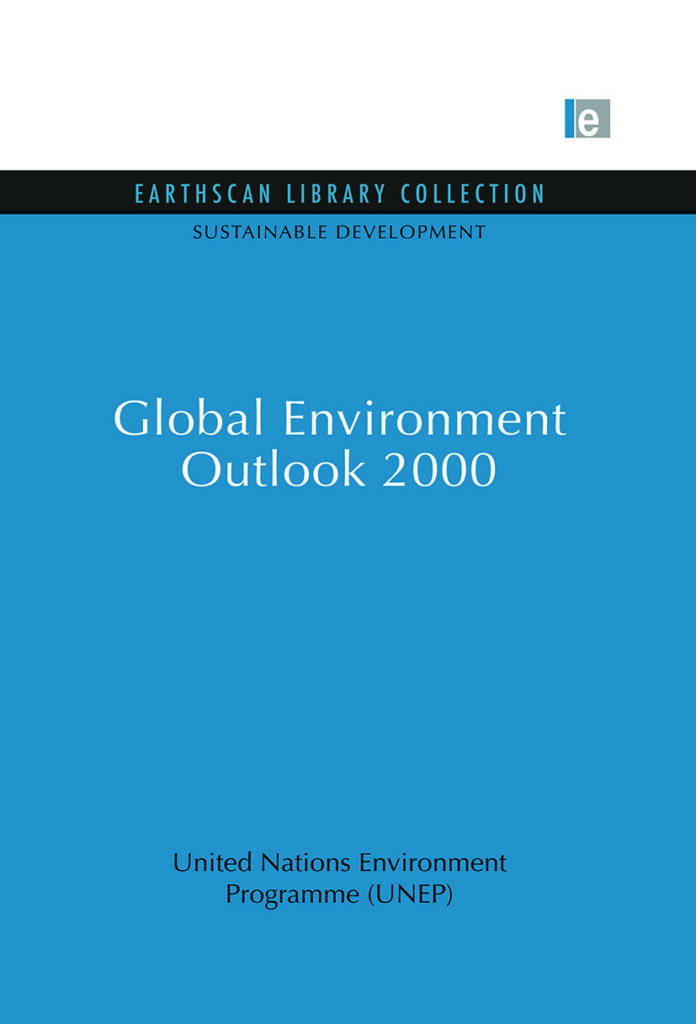United Nations Environment Programme, Nairobi
Today, the United Nations Environment Programme (UNEP) launches Global Environment Outlook 2000 (GEO-2000) – the most authoritative assessment ever of the environmental crisis facing humanity in the new millennium.

Based on contributions from UN agencies, 850 individuals and 30 environmental institutes, GEO-2000 outlines progress in tackling existing problems and points to serious new threats. It concludes its report by setting out recommendations for immediate, integrated action.
GEO-2000 analyses both global and regional issues. Its key finding is that: “The continued poverty of the majority of the planet’s inhabitants and excessive consumption by the minority are the two major causes of environmental degradation. The present course is unsustainable and postponing action is no longer an option.”
Despite successes on various fronts, time for a rational, well-planned transition to a sustainable system is running out fast. In some areas, it has already run out. In others, new problems are emerging which compound already difficult situations.
According to GEO-2000, full scale emergencies now exist in a number of fields. The world water cycle seems unlikely to be able to cope with demands in the coming decades, land degradation has negated many advances made by increased agricultural productivity, air pollution is at crisis point in many major cities and global warming now seems inevitable.
Tropical forests and marine fisheries have been over-exploited while numerous plant and animal species and extensive stretches coral reefs will be lost for ever – thanks to inadequate policy response.
In a survey conducted by the Scientific Committee on Problems of the Environment for GEO-2000, 200 scientists in 50 countries identified water shortage and global warming as the two most worrying problems for the new millennium. Desertification and deforestation at national and regional level was also a frequently cited concern.
While most issues raised by the survey are well-known, GEO-2000 also identifies new threats such as:
- nitrogen’s harmful impact on ecosystems
- increased severity of natural disasters
- species invasion as a result of globalization
- increased environmental pressures caused by urbanization
- decline in the quality of governance in some countries
- new wars which impact on both the immediate environment and neighbouring states
- the impact of refugees on the natural environment
At the core of GEO-2000’s recommendations is a reinforcement of Agenda 21’s call for environmental integration. “The environment remains largely outside the mainstream of everyday human consciousness and is still considered an add-on to the fabric of life,” says GEO-2000.
Institutions such as treasuries, central banks, planning departments and trade bodies frequently ignore sustainability questions in favour of short-term economic options. “Integration of environmental thinking into the mainstream of decision-making relating to agriculture, trade, investment, research and development, infrastructure and finance is now the best chance for effective action,” says GEO-2000.
National Governments, international organizations, private sector, community groups, NGOs and ordinary citizens all have a role to play in putting the environment at the forefront of the political agenda, says GEO-2000. “Environmental education, like mathematics, (should be) part of the standard educational curriculum,” says GEO-2000, adding that we must “encourage the media to devote as much attention to environmental issues as they do to crime, politics, sport and finance.”
GEO-2000 welcomes the trend towards increased public concern for the environment. “Until recently, few individuals cared about or even knew of the environmental issues facing the planet. Today, popular movements in many countries are forcing authorities to make changes.”
GEO-2000 was edited by Robin Clarke – and published by Earthscan
Publications on behalf of UNEP. It costs £20.
Coverage summary, click here
Coverage highlights
| AFP | Water supply, land degradation threatening Asia, says UN report |
| AFP | Outlook grim for world’s environment as new millennium looms: UN |
| AFP | U.N. Study links poverty, environmental woes in Africa |
| Reuters | Time is running out for the environment, UN says |
| DPA | |
| Canadian Press | Water shortages and climate change are greatest threats: UN |
| Southam News | UN issues killer weather alert: Hurricane Floyd on leading edge of century of natural disasters, report says |
| Financial Times | World on environment collision course |
| Earth Times | New extensive UN report warns of eco-crisis in next millennium |
| Earth Times (2nd story) | |
| Toronto Star | U.S. warns environment is in critical condition |
| Globe & Mail | UN sounds alarm over global environment; Damage done may be irreversible, report says |
| Globe & Mail (2nd story) | |
| Toronto Sun | Doomsday near, UN says |
| Montreal Gazette | Whither the weather?: Hurricane is only a taste of what’s coming, UN report says |
| Edmonton Journal | The worst is yet to come in 21st century — UN report |
| Ottawa Citizen | UN issues killer weather alert: Hurricane Floyd on leading edge of century of natural disasters, report says |
| Calgary Herald | Pollution worsens weather, UN says |
| St. Catharines Standard | Floyd just the beginning of more wicked weather: UN report says Earth faces bigger disasters from global warming |
| BBC World Service | UN warns of Earth crisis |
| CBC National | |
| CBC Newsworld | |
| CBC Newsworld (Dayside) | Bigger storms: A new UN study warns we should brace for bigger storms similar to Hurricane Floyd. The report points to global warming as one of the causes |
| BBC World Service | UN warns of Earth crisis |
| CBC National Radio | UN study warns complacency biggest threat to environment |
| Time Magazine | We’re on the eve of destruction, UN warns |
| Newsweek | Worldview interview |
| Environment News Service | Global Eco-Crisis Imminent |
| Greenwire | |
| UN Wire | |
| BBC Online | UN urges rich to slash consumption |
| MSNBC | Water, climate top scientists concerns |